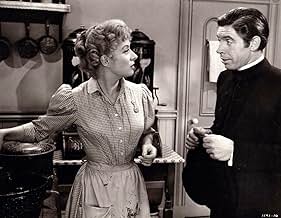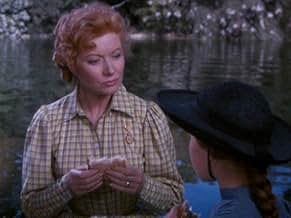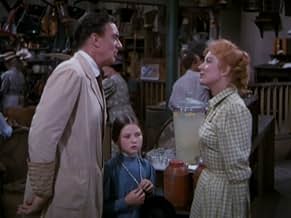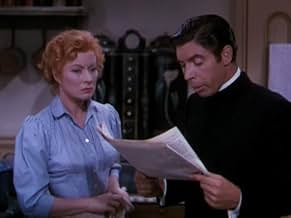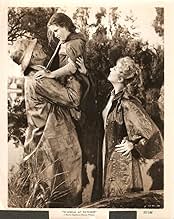Aggiungi una trama nella tua linguaAfter their orphanage burns down, a group of children are being transported west by train to Manitoba. All of them are available for adoption and at a stop at Scourie, Ontario little Patsy m... Leggi tuttoAfter their orphanage burns down, a group of children are being transported west by train to Manitoba. All of them are available for adoption and at a stop at Scourie, Ontario little Patsy meets Victoria McChesney. Victoria and her husband Patrick have no children and she immedia... Leggi tuttoAfter their orphanage burns down, a group of children are being transported west by train to Manitoba. All of them are available for adoption and at a stop at Scourie, Ontario little Patsy meets Victoria McChesney. Victoria and her husband Patrick have no children and she immediately decides to adopt the girl. The only condition imposed on them is that as Patsy has be... Leggi tutto
- Regia
- Sceneggiatura
- Star
Recensioni in evidenza
With many rooms in her mansion, the childless Ms. Garson decides to adopt Corcoran...
But the child is Catholic and may stymie the political career of husband Walter Pidgeon (as Patrick J. McChesney)...
"Scandal at Scourie" could have used a more worldly title. It's a cute family film, immaculately produced by Edwin H. Knopf...
The former box-office favorite is as good as ever - arguably, Garson is even better in her post-1940s roles. The luscious cinematography by Robert Planck and gorgeous soundtrack by Daniele Amfitheatrof give it a storybook quality. "Green Sleeves" and "Frère Jacques" are employed very well. Director Jean Negulesco knows how to use his resources. The scene with Garson running through town to a barber shop is a highlight, and Mr. Negulesco guides Corcoran, freckle-faced Tony Taylor (as Edward) and the children nicely. The message of religious tolerance is admirable. Still, while the ingredients are all present, "Scandal at Scourie" has no real depth. A couple of scenes with Garson and Mr. Pidgeon privately discussing their marriage, faith and presumed inability to have children would have given the film an edge.
******* Scandal at Scourie (1953-05-17) Jean Negulesco ~ Greer Garson, Walter Pidgeon, Donna Corcoran, Tony Taylor
The story begins in French Quebec. An orphanage has burned down and the nuns are forced to find homes for the kids throughout the neighboring provinces. At Scourie*, in Ontario, a childless mother (Greer Garson) meets one of these children when their train stops in the town. Victoria McChesney (Garson) is so taken with Patsy (Donna Corcoran) that she insists on adopting the girl...even though the child has been raised Catholic and the McChesneys are Protestants. In order to convince the nuns to allow Patsy to remain with them, she promises to raise the child Catholic...while she and her husband remain Protestants. Now today, this all would be no big deal. But in late 19th century Canada, this must have been a big scandal...raising a child of a different faith. What is to become of all this? See the film.
While enjoyed the movie and felt that Garson and Corcoran were wonderful in the story, I was very surprised that MGM would make Pidgeon such an unlikable jerk during much of the film. He plays Garson's husband and seems more concerned about folks' opinions than anything else. And, as a result, the film lacks the likability of the other Garson/Pidgeon pairings. It's a shame, as otherwise I liked the film...though the sound effects they used for the goldfish were strange and alien...which made little sense.
*I looked and there is no city in Ontario by the name of Scourie and assume it was just made up for the movie.
I recommend this one only for extremely diehard fans of Garson. Her cohort Walter is so-so but effective. Unsurprisingly, the children in the cast propel the storyline.
It's important to consider that the biggest conflict presented is protestant vs. Catholic. And that's not a spoiler. Might seem more than tame now, but it was notable then.
They're a childless couple who enjoy a prominent position in a small Canadian town. When a group of orphans arrive by train, the nuns in charge try to pawn them off - sorry, find the children homes. Greer falls in love with a sweet little girl, Donna Corcoran, and against Pidge's wishes, she brings Donna home and arranges adoption proceedings. It was a very tricky move on her part, but her husband's reluctance is the least of her worries. Donna is a Catholic, and nearly the entire town (including Greer and Pidge) are Protestants. As part of the adoption, Greer vows to honor Donna's religion and raise her as a Catholic. All of a sudden, she's serving fish for Friday dinner, and she's walking into the wrong church on Sunday! That certainly is a scandal.
Personally, I like Blossoms in the Dust. But that's a very heavy drama, and it's not one you can watch on a Saturday afternoon and enjoy yourself. If you like the idea of Greer and Pidge helping orphans, but you'd rather skip the tragedy, you can try this "knock-off". But call your dentist.
This film deals with religious bigotry, and does so effectively. Both films demonstrate that when people take a respectful, but firm stand for something, they can achieve a worthy result. It is a moral picture as one has mentioned, and is well done. People have paid a price to effect vital change. That's a worthy theme.
I have wondered in each case, whether Greer Garson had an interest in the cause. She would have had more choices of films during these periods, I would think. In any event, as usual, she did a good job.
The only time I thought she was actually bad in something (a couple of her films themselves were weak) was in her depiction of Eleanor Roosevelt in "Sunrise at Campobello" with Ralph Bellamy as FDR. The accent and manner were pretty awful -- no, really awful.
But this is a good film. TCM shows it fairly regularly, as part of a Walter Pidgeon birthday salute or for Greer Garson, etc.
Lo sapevi?
- QuizLast of eight movies that paired Greer Garson and Walter Pidgeon. The others are Fiori nella polvere (1941), La signora Miniver (1942), Madame Curie (1943), La signora Parkington (1944), La bella imprudente (1948), La saga dei Forsyte (1949), and Addio, signora Miniver (1950).
- BlooperAt the beginning of the film it is obvious from the motion of the flames at the burned down orphanage that the shot is being run in reverse (or backwards).
- Citazioni
Mrs. Victoria McChesney: [Mrs. McChesney is explaining to her adopted daughter why a little boy at school called her a bast - -] That word at school. It frightened you, didn't it? Do you know what it means?
[Patsy shakes her head]
Mrs. Victoria McChesney: And still it frightens you?
Patsy: I know it's bad.
Mrs. Victoria McChesney: Well, now, it's not really bad at all! Some people think it's bad just because they don't understand. You see, Patsy, what happened was that a lovely young girl met a handsome young man and they fell in love, but for some reason they couldn't get married. I don't know what the reason was, and it doesn't matter, but their sin is not yours, and they're paying for it terribly.
Patsy: How?
Mrs. Victoria McChesney: Because they haven't got you, sweetheart.
- Colonne sonoreGreen Sleeves
Traditional Air
I più visti
- How long is Scandal at Scourie?Powered by Alexa
Dettagli
Botteghino
- Budget
- 1.148.000 USD (previsto)
- Tempo di esecuzione1 ora 30 minuti
- Proporzioni
- 1.37 : 1
Contribuisci a questa pagina



